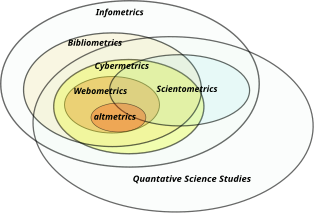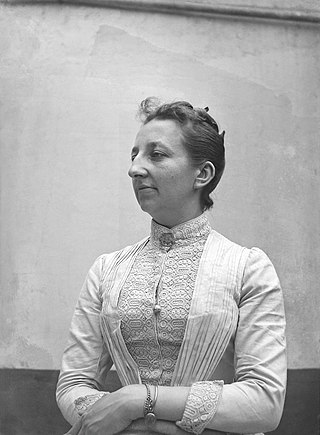
The Dewey Decimal Classification (DDC), colloquially known as the Dewey Decimal System, is a proprietary library classification system which allows new books to be added to a library in their appropriate location based on subject. It was first published in the United States by Melvil Dewey in 1876. Originally described in a 44-page pamphlet, it has been expanded to multiple volumes and revised through 23 major editions, the latest printed in 2011. It is also available in an abridged version suitable for smaller libraries. OCLC, a non-profit cooperative that serves libraries, currently maintains the system and licenses online access to WebDewey, a continuously updated version for catalogers.

The Universal Decimal Classification (UDC) is a bibliographic and library classification representing the systematic arrangement of all branches of human knowledge organized as a coherent system in which knowledge fields are related and inter-linked. The UDC is an analytico-synthetic and faceted classification system featuring detailed vocabulary and syntax that enables powerful content indexing and information retrieval in large collections. Since 1991, the UDC has been owned and managed by the UDC Consortium, a non-profit international association of publishers with headquarters in The Hague, Netherlands.

Information science is an academic field which is primarily concerned with analysis, collection, classification, manipulation, storage, retrieval, movement, dissemination, and protection of information. Practitioners within and outside the field study the application and the usage of knowledge in organizations in addition to the interaction between people, organizations, and any existing information systems with the aim of creating, replacing, improving, or understanding the information systems.

A document is a written, drawn, presented, or memorialized representation of thought, often the manifestation of non-fictional, as well as fictional, content. The word originates from the Latin Documentum, which denotes a "teaching" or "lesson": the verb doceō denotes "to teach". In the past, the word was usually used to denote written proof useful as evidence of a truth or fact. In the Computer Age, "document" usually denotes a primarily textual computer file, including its structure and format, e.g. fonts, colors, and images. Contemporarily, "document" is not defined by its transmission medium, e.g., paper, given the existence of electronic documents. "Documentation" is distinct because it has more denotations than "document". Documents are also distinguished from "realia", which are three-dimensional objects that would otherwise satisfy the definition of "document" because they memorialize or represent thought; documents are considered more as two-dimensional representations. While documents can have large varieties of customization, all documents can be shared freely and have the right to do so, creativity can be represented by documents, also. History, events, examples, opinions, etc. all can be expressed in documents.

Bibliography, as a discipline, is traditionally the academic study of books as physical, cultural objects; in this sense, it is also known as bibliology. English author and bibliographer John Carter describes bibliography as a word having two senses: one, a list of books for further study or of works consulted by an author ; the other one, applicable for collectors, is "the study of books as physical objects" and "the systematic description of books as objects".
A faceted classification is a classification scheme used in organizing knowledge into a systematic order. A faceted classification uses semantic categories, either general or subject-specific, that are combined to create the full classification entry. Many library classification systems use a combination of a fixed, enumerative taxonomy of concepts with subordinate facets that further refine the topic.

Paul Marie Ghislain Otlet was a Belgian author, entrepreneur, lawyer and peace activist; predicting the arrival of the internet before World War II, he is among those considered to be the father of information science, a field he called "documentation". Otlet created the Universal Decimal Classification, which would later become a faceted classification. Otlet was responsible for the development of an early information retrieval tool, the "Repertoire Bibliographique Universel" (RBU) which utilized 3x5 inch index cards, used commonly in library catalogs around the world. Otlet wrote numerous essays on how to collect and organize the world's knowledge, culminating in two books, the Traité de Documentation (1934) and Monde: Essai d'universalisme (1935).

The International Federation for Information and Documentation (FID) was an international organization that was created to promote universal access to all recorded knowledge through the creation of an international classification system. FID stands for the original French Fédération internationale de documentation.
The following outline is provided as an overview of and topical guide to information science:
Biological Abstracts is a database produced by Clarivate Analytics. It includes abstracts from peer-reviewed academic journal articles in the fields of biology, biochemistry, biotechnology, botany, pre-clinical and experimental medicine, pharmacology, zoology, agriculture, and veterinary medicine, and has been published since 1926.
Renée-Marie-Hélène-Suzanne Briet, known as "Madame Documentation," was a librarian, author, historian, poet, and visionary best known for her treatise Qu'est-ce que la documentation?, a foundational text in the modern study of information science. She is also known for her writings on the history of Ardennes and the poet Arthur Rimbaud.
Otlet Glacier is a glacier 9 nautical miles (17 km) long, flowing along the south side of Fontaine Heights to the west coast of Graham Land. Roughly charted by the British Graham Land Expedition (BGLE) under Rymill, 1934–37. More accurately mapped by the Falkland Islands Dependencies Survey (FIDS) from photos taken by Hunting Aerosurveys Ltd. in 1956–57. Named by the United Kingdom Antarctic Place-Names Committee (UK-APC) for Paul Otlet (1868–1944), Belgian documentalist, co-founder of the Institut International de Bibliographie at Brussels, 1895, and of the Universal Decimal Classification. He was a pioneer of the rational organization of polar information by an international classification scheme.
The World Congress of Universal Documentation was held from 16 to 21 August 1937 in Paris, France. Delegates from 45 countries met to discuss means by which all of the world's information, in print, in manuscript, and in other forms, could be efficiently organized and made accessible.

Documentation science is the study of the recording and retrieval of information. Documentation science gradually developed into the broader field of information science.

Information history may refer to the history of each of the categories listed below. It should be recognized that the understanding of, for example, libraries as information systems only goes back to about 1950. The application of the term information for earlier systems or societies is a retronym.
Louise Noëlle Malclès was a French librarian, bibliographer and teacher who was a key figure in French librarianship and the author of one of the most important bibliographical works of the mid-20th century. She was one of the first notable French female library professionals, in a field which had been traditionally dominated by men. She was awarded the Legion of Honour for her immense contributions to the field of library science.
W. Boyd Rayward is an Australian librarian and scholar, best known as the biographer of Paul Otlet.

Léonie La Fontaine was a Belgian pioneering feminist and pacifist. Active in the international feminism struggle, she was a member of the Belgian League for the Rights of Women, the National Belgian Women Council and the Belgian’s Women's International League for Peace and Freedom. Her brother was Henri La Fontaine, Belgian international lawyer and president of the International Peace Bureau who received the Nobel Prize for Peace in 1913, and was also an early advocate for women's rights and suffrage, founding in 1890 the Belgian League for the Rights of Women.
Herbert Haviland Field was an American zoologist who founded the Concilium Bibliographicum, a leading science information service in the early twentieth century and was the father of Noel Field and Hermann Field.










